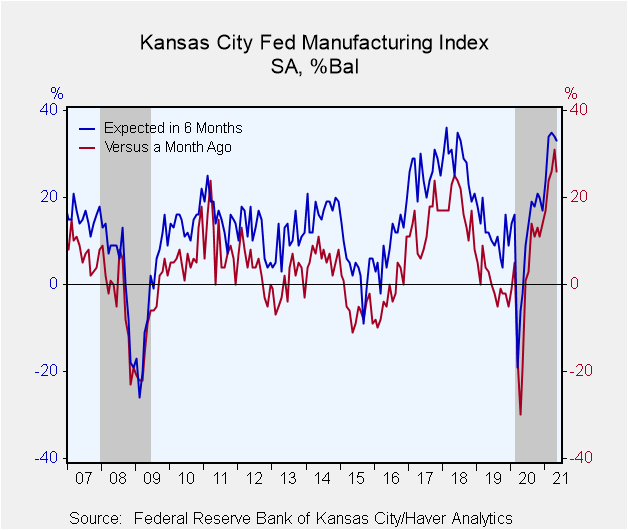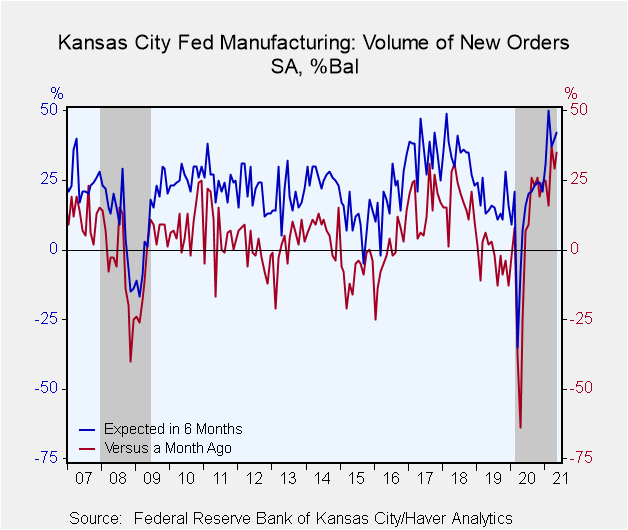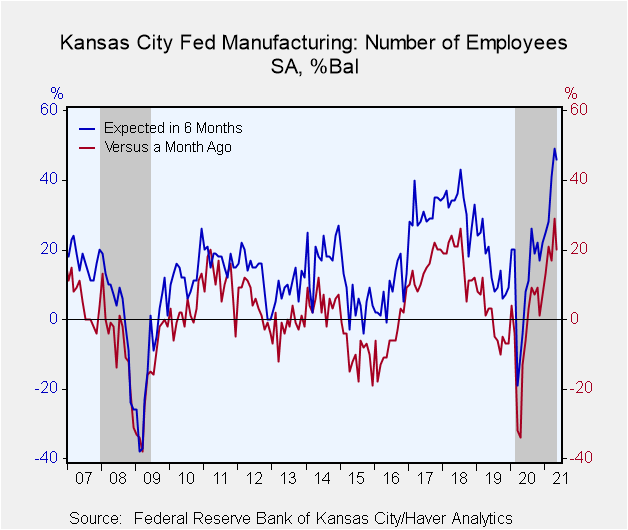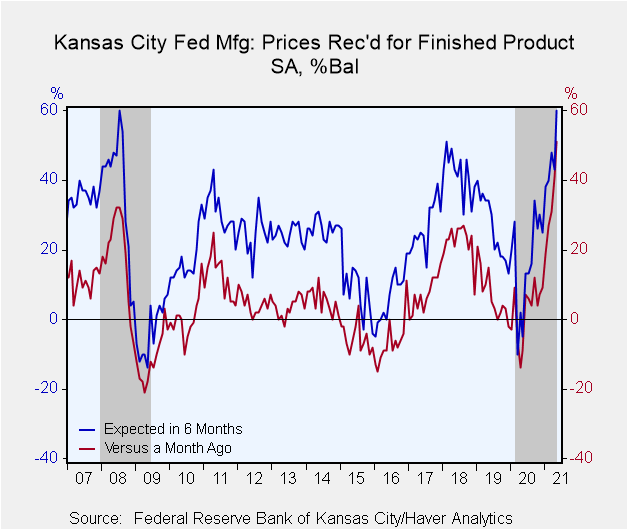 Global| May 27 2021
Global| May 27 2021Kansas City Fed's Factory Sector Index Remains Elevated in May
by:Tom Moeller
|in:Economy in Brief
Summary
• Growth backs off slightly from record level. • Component movement weakens m/m. • Expectations for six months ahead ease again. The Federal Reserve Bank of Kansas City reported that its manufacturing sector business activity index [...]
• Growth backs off slightly from record level.
• Component movement weakens m/m.
• Expectations for six months ahead ease again.
The Federal Reserve Bank of Kansas City reported that its manufacturing sector business activity index fell to 26 during May from the record 31 recorded in April. The headline figure compares to -19 one year earlier. The series dates back to July 2001.
The ISM-Adjusted Index (NSA) eased to 64.5 in May from the record 66.7 in April. The figure remains well above the level of 50 which separates expansion from contraction.
Most individual series backpedaled this month. The shipments index reversed most of April's gain which was to the highest level since June 2018. The order backlog measure fell from the record to the lowest level in four months. The employment series also moved away from the all-time high in April. The production series fell back but remained near its record. The supplier delivery time index dropped, indicating the quickest product delivery speeds since January. Moving upward was the new orders index to 35, nearly a record level.
On the inflation front, the prices received index for finished products strengthened to a record 51 in May. It compared to the deflationary readings registered early last year. The raw materials index also surged to a new record of 86. It remained up from -16 in April of 2020.
The expectations-in-six months composite reading eased to 33 in May from 34 in April, but remained up sharply from -19 in March of last year. Expected new orders and shipments increased but expected employment edged lower after its April surge.
The expectations index for prices received surged m/m to 60 and matched the record level. Expectations for raw materials prices eased in May but remained near its all-time high.
The figures date back to July 2001. The composite index is an average of the production, new orders, employment, supplier delivery time and raw materials inventory indexes. The diffusion indexes are calculated as the percentage of total respondents reporting increases minus the percentage reporting declines. The survey covered plants in Colorado, Kansas, Nebraska, Oklahoma, Wyoming, northern New Mexico and western Missouri. Data for the Kansas City Fed Survey can be found in Haver's SURVEYS database.
| Kansas City Federal Reserve Manufacturing Survey (SA) | May | Apr | Mar | May'20 | 2020 | 2019 | 2018 |
|---|---|---|---|---|---|---|---|
| Conditions Versus One Month Ago (% Balance) | 26 | 31 | 26 | -19 | 0 | 0 | 17 |
| ISM-Adjusted Composite Index (NSA) | 64.5 | 66.7 | 65.4 | 42.4 | 50.1 | 50.0 | 58.9 |
| New Orders Volume | 35 | 29 | 37 | -25 | 1 | -3 | 17 |
| Number of Employees | 20 | 29 | 17 | -13 | -4 | -1 | 17 |
| Production | 32 | 40 | 23 | -25 | 0 | 2 | 19 |
| Prices Received for Finished Product | 51 | 41 | 31 | -9 | 2 | 7 | 22 |
| Expected Conditions in Six Months | 33 | 34 | 35 | -2 | 10 | 12 | 28 |
| New Orders Volume | 42 | 40 | 37 | 7 | 12 | 17 | 35 |
| Number of Employees | 46 | 49 | 41 | -4 | 11 | 15 | 33 |
| Production | 50 | 45 | 45 | -2 | 14 | 19 | 40 |
| Prices Received for Finished Product | 60 | 43 | 48 | -5 | 16 | 26 | 42 |
Tom Moeller
AuthorMore in Author Profile »Prior to joining Haver Analytics in 2000, Mr. Moeller worked as the Economist at Chancellor Capital Management from 1985 to 1999. There, he developed comprehensive economic forecasts and interpreted economic data for equity and fixed income portfolio managers. Also at Chancellor, Mr. Moeller worked as an equity analyst and was responsible for researching and rating companies in the economically sensitive automobile and housing industries for investment in Chancellor’s equity portfolio. Prior to joining Chancellor, Mr. Moeller was an Economist at Citibank from 1979 to 1984. He also analyzed pricing behavior in the metals industry for the Council on Wage and Price Stability in Washington, D.C. In 1999, Mr. Moeller received the award for most accurate forecast from the Forecasters' Club of New York. From 1990 to 1992 he was President of the New York Association for Business Economists. Mr. Moeller earned an M.B.A. in Finance from Fordham University, where he graduated in 1987. He holds a Bachelor of Arts in Economics from George Washington University.
More Economy in Brief
 Global| Feb 05 2026
Global| Feb 05 2026Charts of the Week: Balanced Policy, Resilient Data and AI Narratives
by:Andrew Cates










